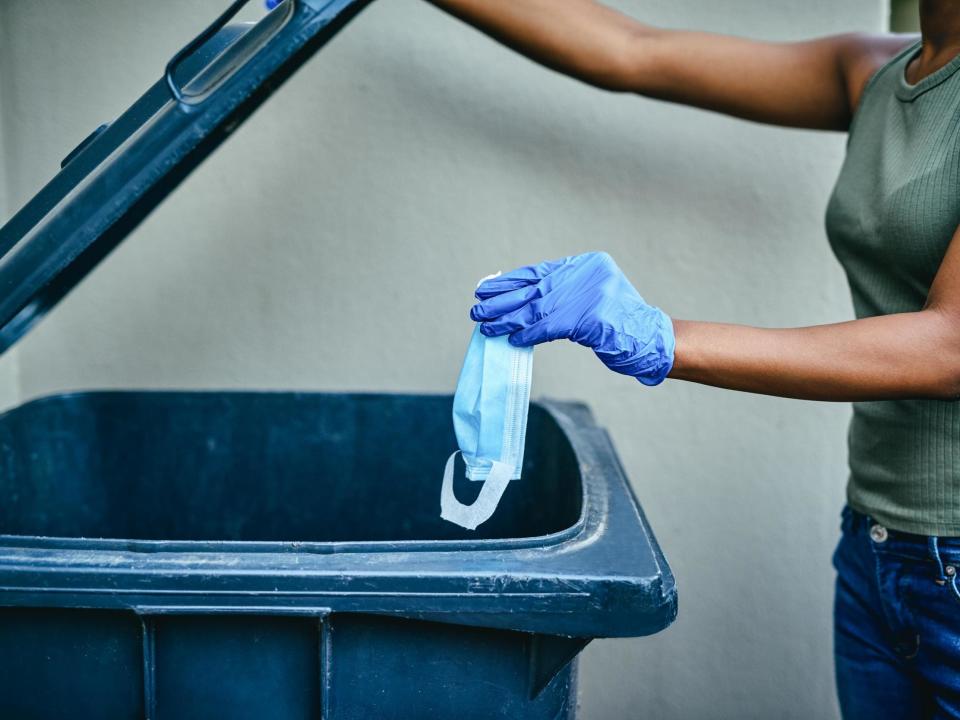The new plastic bottle? How to dispose of face masks in an environmentally-safe way

Medical face coverings have long been worn in the community in some countries, like China and Japan, or in clinical settings. But in recent months, since the Covid-19 pandemic, face coverings have boomed in worldwide popularity.
In many jurisdictions they are now mandatory for going out in public; in England they are compulsory on public transport, in shops, in supermarkets, hair salons, beauty parlours, libraries, places of worship, community centres, vets, and other indoor settings where you are likely to come into contact with people you do not normally see.
Of course these new rules are designed to protect us from the spread of the virus, but the surge in usage does have a downside; an increase in the amount of single-use plastic waste we are generating as a result. Globally we are using 129 billion face masks and 65 billion plastic gloves every month, according to some estimates.
Some masks are reusable (virologists recommend machine-washing regularly) but for single-use options, every time you throw one away you’re generating more rubbish for landfill. In five years will masks have become the new single-use plastic water bottle?
As well as the environmental cost of throwing away face masks, users should be considering if they are getting rid of it safely, to protect anyone else from the potential biological hazard an infected mask might present.
The Independent asked experts about how best to go about ditching your used masks.
How do I dispose of a mask safely?
In April the government issued guidance on disposing of Covid-waste, saying that anyone with the virus should dispose of their household waste in a rubbish bag placed into a second rubbish bag. The outside bag should be securely tied and then kept separate from other people’s waste.
For masks specifically the World Health Organisation (WHO) says you should dispose of a mask as soon as it is damp. To remove the mask: clean your hands first; remove it from behind with the ear or head strap (do not touch the front of the mask); pull the mask away from your face; discard immediately in a closed bin; wash hands with alcohol-based hand rub or soap and water.
The Department for Environment, Food and Rural Affairs (Defra) says you should not recycle any used items as they “cannot be recycled” and if you are unwell with coronavirus symptoms you should store your waste safely for 72 hours before putting it in communal or external bins.
How do I dispose of a mask in an environmentally-friendly way?
Organisations across the UK have already flagged the short-term impact of improper PPE disposal by the public: Jemma Bere, policy and research manager for Keep Wales Tidy, said their organisation had noticed a “significant and widespread increase in PPE being littered”, with the masks and disposable gloves found on pavements and parks across Wales.
The Worldwide Wildlife Fund (WWF) has also reported concerns about incorrect disposal, saying: “If even only 1 per cent of the masks were disposed of incorrectly...this would result in 10 million masks per month dispersed in the environment. Considering that the weight of each mask is about 4 grams this would entail the dispersion of over 40 thousand kilograms of plastic in nature.”
Sadly, littering is not the only way these masks find their way into our waterways and seas but they are also being flushed down the toilet.
So how should we dispose of these non-biodegradable masks? Head of Clean Seas, Dr Laura Foster, tells The Independent that the best place for single-use masks is the bin, saying users should be wary of accidentally dropping them in public or leaving them outside in nature: “If you’re opting to wear a single-use mask, in line with government and WHO guidance, then please ensure to dispose of the mask correctly, by throwing it in the bin.”
Environmental experts say even if we put them in bins they could still end up finding their way to rivers, oceans, into the environment – or end up filling up more landfill sites – so we should just avoid single-use plastic masks where possible.
Amanda Keetley, founder of Less Plastic, says none of us should be buying single-use masks. She tells The Independent: “My view is that there is no safe way to dispose of single-use face masks,” she says. “Anything that’s been specifically created to be used just once and then thrown away, will either end up in landfill, or escape into nature as our waste infrastructure can’t cope with the volumes we produce.”
Keetley adds: “Unless you’re in a medical situation, the best option is to get a reusable face mask that can be worn and washed again and again.”
If face coverings are now going to be part of everyday life in the future, how can countries ensure they are doing everything they can to avoid unnecessary waste?
The UCL Plastic Waste innovation Hub is currently trying to get the UK government to stop promoting single-use masks for the public. And Mike Bilodeau, PlasticOceans regional director for Europe, says instead of importing PPE, it should be made locally and done in such a way that the plastic elements can be recycled and reused – thus making it more environmentally friendly in the long term.
Read more
Face Off: How to care for your skin while wearing a face mask

